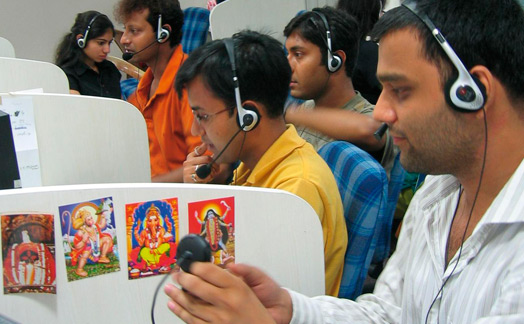
Pick up the Phone [by James Wenley]
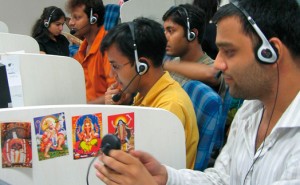
The best advice I can give those who are going to Call Cutta in a Box is this: Go with your defences down, an inquisitive mind, and an open heart.
The consensus does seem to be that the less you know going into Call Cutta the better. So for those don’t want to be spoiled, read this review after you’ve seen it. But for those who can’t get to it, or just can’t help themselves, here is my experience.
At the New Performance Festival Box Office I’m given a map to an office building on Queen St. I go to Level 5 as directed and find myself in a law firm. A woman at the desk asks for my name then tells me to wait, then taps away on her computer ignoring me. It feels awfully authentic, however I recognise her as an Edge staff member, another man that comes past as an actor, another person a techie. But for someone unaware of this conciet, I’d imagine they’d find it a bit disconcerting. I’m told they’re ready for me, and I enter a small room containing a desk, computer, pot plant, and couch.
A phone rings. I pick it up. A voice says “Kiora”. The play begins…
The voice on the other end introduces himself as Suman. He says he’s calling from Kolkata. He knows my name. He begins to strike up a conversation. He asks me if I’m nervous. I say I’m not. He said that my voice sounds like I’m not. He asks if I’d like any tea. He says he can make some for me. A kettle starts to boil as if by magic.
Suman comes out with a fairly full on question, without warning, early on: “Are you satisfied in your life?” I’m taken aback but attempt to answer honestly. He asks if he can ask some personal questions, and I say he can. It can be a tough ask opening up to a stranger, but there’s something about the anonymity, and the excitement about the situation, that makes it okay. And while I hadn’t at all expected it, it was interesting to reflect on my own life and current stage. He’s excited about by young age, telling me there’s so much I’m going to achieve.
We talk about and compare our hometowns and our place of work, and he directs me towards a picture of his call centre building hidden in the room. There are many such clever hidden objects around the room that he’ll either help you find, or control with the powers of technology.
As our conversation goes on, Suman is open about following a script, and lets me know what scene we are up to. I enjoy the scene where time goes by quickly. We can go off the script too – he’s more than happy to answer questions I pose to him.
I learn that Suman has dreams to be a documentary filmmaker, sharing real life stories as opposed to the fictions of the Bollywood film. Picking up on my own love of theatre, he talks about the Kolkata theatre scene – it isn’t so big on ‘proscenium’ theatre, there’s a thriving experimental community with a lot of interest in audience participation, not to mention the many street performers. Kolkata certainly leaped up my list of places to travel.
There is something wonderfully subversive about the whole experience. When not enlisted to participate in Call Cutta, he spends 8 hours a day selling telecom services to Australia. That’s right, a telemarketer (a dirty word around the dinner table). Not everybody is happy when he calls. And here we are in a theatre show, (brainchild of German theatre collective Rimini Protocal, who work with real people and real situations) in which audiences are asked to pay money to speak to him.
And then there’s the fact that we’re participating in a phone call, then later a Skype, a situation that the audience member would find themselves in everyday. So what’s the appeal? And an appeal, there really, really is. And it goes deeper than the many (admittedly brilliantly clever) surprises that Suman controls in the room.
Suman talked a lot about how we were making a play together, and that captures a lot of it. As a play, it takes you beyond your own life, giving a glimpse of his, and humanises a foreign job that isn’t thought of highly in the Western world.
It strips back theatre to its rudimentary forms – a conversation (mediated by technology) between a performer and an audience member. Except, at various times you are the performer and they the audience. Sometimes, you are both. You are creating it together.
It’s also really appealing to feel like you are genuinely being listened too.
I would however modify Suman’s description, we were more than making a play together, we were making play together. We got to draw images of what we thought each other looked like based on our voices. He sang to me, and I sang Queen’s Don’t Stop me Now to him. “No-one can stop you in life!” he exclaims back. At the end, we get to dance together, separated on other ends of the earth. It’s fun, and it feels very human.
I honestly feel like I made a friend in that room. It’s certainly Facebook official – we made friends online soon afterwards. Was I suckered in? Was he merely following his own end of the script? He’d certainly be trained to make his listeners feel special. But I don’t think so. In our conversation there was a genuine feeling and infectious warmth, and when we went ‘off the script’ he was very giving with his answers and the conversation flowed freely.
I came out of the room absolutely enthused with life, grinning ear to ear.
Call Cutta in a Box is part of the New Performance Festival and runs until Saturday 25 February. More information at THE EDGE.
SEE ALSO: Theatreview review by Raewyn White

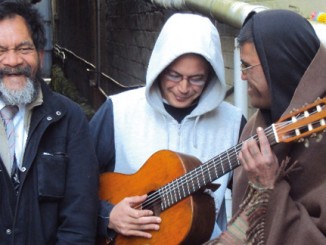
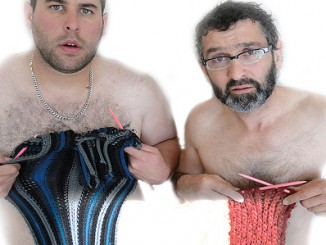
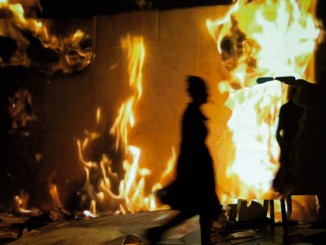
Leave a Reply